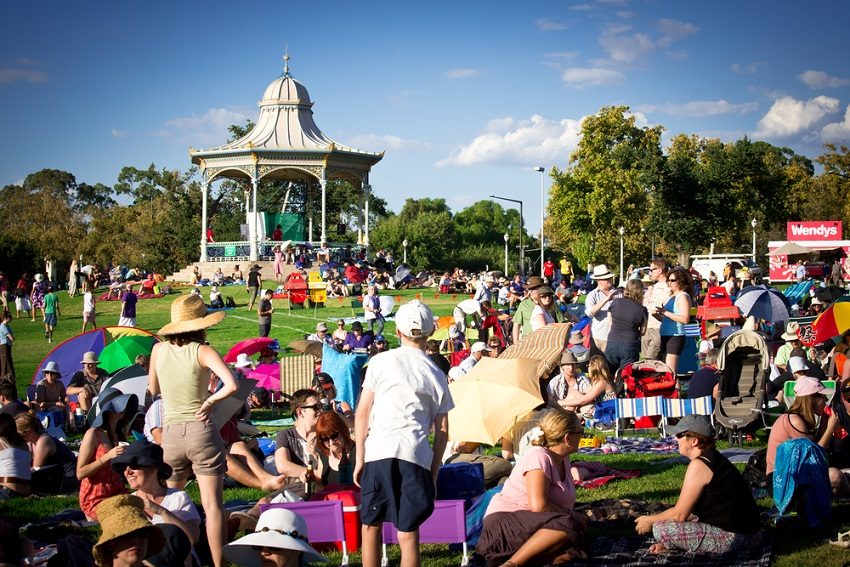
As Adelaide’s summer outdoor event calendar begins to deliver, scrutiny of the lucrative handouts on which some depend throws fascinating new light on what they promised, the amounts sought, and the conditions attaching.
Sir Monty has straddled the contours of commerce for many years and wonders if Adelaide might represent a veritable Garden of Eden when it comes to public grants. There are tempting odds of doing very nicely thanks to Town Hall generosity towards various groups planning festive fun – despite some circumstances that might raise eyebrows in some quarters.
In July 2016 Monty scrutinised the annual Town Hall Sponsorships, which disbursed $1.502 million on 24 festival and event sponsorships. Large-crowd events will occur over the coming year. The outcomes hinted at what Sir Monty might contemplate doing, were he to seek a sweet slice of the public money pie.
In the musical category, he noted that WOMADelaide (the four-day world music festival) had scored a windfall of $55,000, significantly up from $35,000 last year, because it promised to deliver 95,000 visitors to town, with a $14.1m economic impact, against a total project cost of $7.699m. A healthy ratio!
Organisers actually wanted $90,000, but were somewhat placated with the knowledge that the $55k will flow in 2017–18, and 2018–19, similar to those treasured bank guarantees that Sir Monty’s colleagues at the Adelaide Club dream of snagging as they snooze before the fireplace. The money prompts Sir Monty, he of Services to Old Adelaide Money, to immediately begin taking one-legged flute lessons while mastering the craft of the three-stringed kazoo just in case the giving of advice about stocks and bonds to St George’s widows suddenly slips out of favour and he has to fall back on WOMAD patronage.

Town Hall awards event grants based on the expected community benefit from those events, but does every event deliver what’s promised?
In another category, the 2016 Vegan Festival (the GIVE Foundation; one day only;November 6, 2016) was revealed to have scored $10,000, promising 9000 attendees (even though the event hasn’t been held before) and an economic impact of $61,500. This contrasted an $81,300 cost to run it. Such charity, especially from a charity team focused on addressing global poverty itself. This new event had scored the windfall through a Town Hall CEO delegated decision and thus appears not to have run the same rigorous assessment gauntlet that many others faced.
There was no evidence in the paperwork, except for the statement: “CEO delegation to approve funding recommendations up to $10k to enable a quicker turnaround for smaller proposals.”
Such a prompt, no-nonsense approach is treasured in Sir Monty’s financial experience, because ‘inappropriate red tape’ can often block the gateway to free public money. But as 10 gorillas can buy a lot of tofu, lettuce and mung bean paste, Sir Monty has immediately changed his diet in a strong vegetable direction, although he notes that the time spent waiting for green things to grow is like waiting for 10-year bonds to mature. Such is the cost of turning vegan.
In a third category, the 2016 Feast Festival (Feast Festival Incorporated; October 21 to November 6, 2016) scored a bullseye result, doubling its previous year’s funding to $40,000 plus an offer of same for the following two years (it did want $50k but, well, double the return on the 2015 windfall ($20k) is great in these tight days). The paperwork claims that Feast is an annual ‘gay, lesbian, bisexual, transgender, intersex and queer’ cultural festival. Its focus is “queer culture, lives and pride”.
Organisers claim costs of $858,914 to run it. Sources are Arts SA (that is, taxpayers) $150,000 cash (confirmed); other sponsors (not disclosed) $250,000 cash (60 percent confirmed); and other sponsors $400,000 in-kind (40 percent confirmed). Feast claims an astonishing $9.87m economic impact for the city from its 15 days of Riverbank fun and frivolity (an extraordinary ratio relative to the cost to run it) attracting 40,000 attendees.
But Town Hall dourly notes that this claim is “unofficial”, a polite way of saying ‘speculative’. Immediately notable is that Feast’s economic impact claim is not far off WOMAD’s, which is astonishing, but Feast organisers claim that theirs attracts lots of Americans and Canadians. Their dollars are worth more.
Reverting to Town Hall’s sponsorship fine print, Sir Monty noticed the following note: “[Feast] Funding in 2017–18 and 2018–19 is conditional on the organisation producing audited financial statements which show a favourable reduction in the deficit that the event has carried over a number of years.”
The deficit is revealing – 2013: $29,521; 2014: $79,175; 2015: $82,841.
Sir Monty might be a little slow, but obviously the best Feast tactic to address that caveat and thus guarantee the second and third tranches would be to spend some of the 2016 $40,000 to reduce the deficit by a few dollars as well as pay the auditor’s fee (whose report would note the reduction, thus guaranteeing the next two tranches in 2017 and 2018). As they say in the Club (using the usual arcane financial jargon) – “It’s a no-brainer”.
Apparently the event has “enduring importance in recognition of social diversity and promotion of tolerance.” It’s the sort of tolerance that Sir Monty, always on the lookout for windfalls of public money, has sought all his business life.
Verily, he concludes, the hard-nosed commercial approaches of Main Street do not apply in a Garden of Eden, and even more so on the grassy banks of the city’s only river.